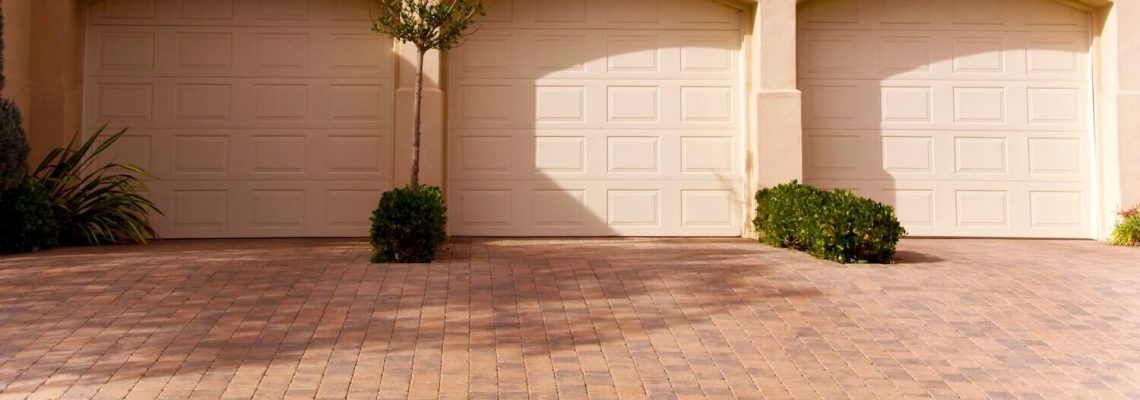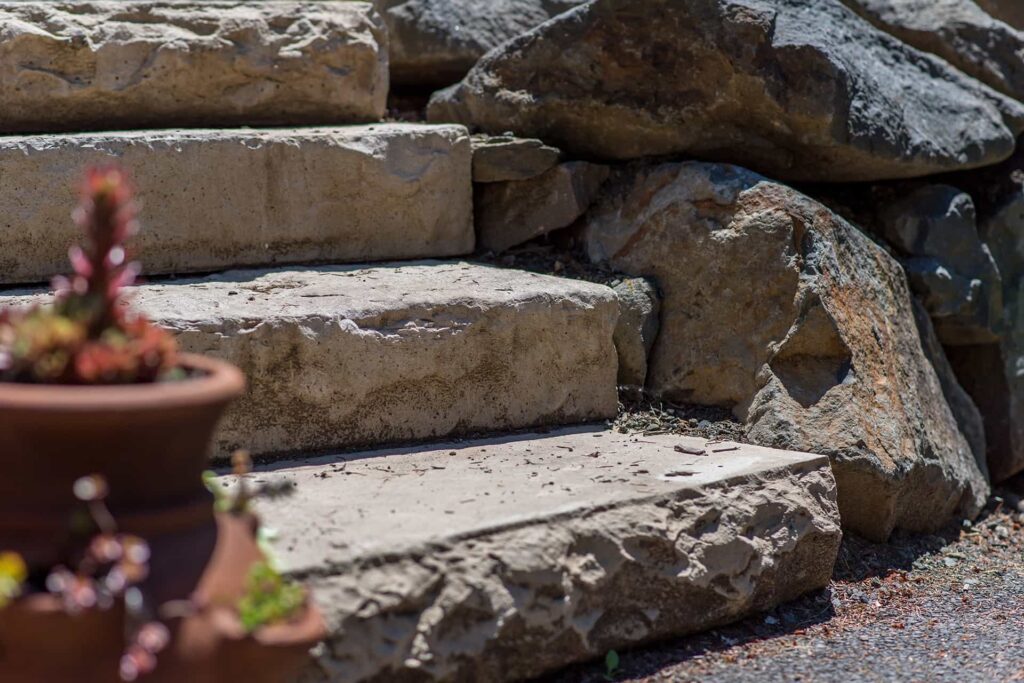Heavy rainstorms and excessive water runoff can wreak havoc on residential properties, especially in areas prone to heavy rainfall. One of the first places affected by flooding is often the driveway. Driveways made from traditional materials like asphalt or concrete may not hold up well in wet conditions, leading to cracks, potholes, and water pooling. If you’re looking for a solution that can withstand rainy weather while enhancing the appearance of your property, pavers are an excellent option.
This article will explore why pavers are a superior choice for driveways in wet climates, detailing their benefits and why they are a smart long-term investment.
1. Why Traditional Driveways Struggle in Rainy Weather
Driveways made from asphalt or concrete are common choices, but they often come with significant downsides when exposed to prolonged moisture. Understanding the challenges posed by these materials helps highlight why pavers offer a better solution in areas with frequent rain.
Asphalt Driveways
Asphalt is affordable and relatively easy to install, but it can suffer from wear and tear when subjected to frequent rainfall. Over time, moisture can penetrate the asphalt, leading to cracks and potholes. Freeze-thaw cycles exacerbate this issue, causing the surface to expand and contract, which accelerates the damage. Without proper drainage, water can pool on the driveway, leading to structural damage and unsightly surface imperfections.
Concrete Driveways
Concrete is durable but has its own set of challenges in wet conditions. While concrete is more resistant to water than asphalt, it can still crack and develop erosion issues. In heavy rain, water can settle into cracks, and the repeated freeze-thaw cycle can lead to significant damage. Additionally, concrete driveways may require significant drainage solutions to prevent water buildup.
Limited Drainage Capabilities
The primary issue with both asphalt and concrete driveways is their inability to properly manage water. These materials are non-porous, meaning that water doesn’t soak through them. Instead, the water has to flow off the surface, and without a sufficient drainage system in place, pooling, flooding, and erosion can occur. These problems can affect not only your driveway but also your lawn and foundation over time.
2. The Advantages of Pavers in Rainy Weather
Unlike traditional driveway materials, pavers offer several advantages in managing water and minimizing the risks associated with flooding. Here’s a closer look at why pavers stand out in wet climates.
Permeability
One of the standout benefits of pavers is their permeability. Permeable pavers allow water to seep through the spaces between each paver, reducing water runoff. Instead of sitting on the surface or being forced into storm drains, rainwater is absorbed directly into the ground below the driveway. This natural drainage process not only helps prevent flooding but also minimizes erosion in surrounding areas.
Permeable pavers are designed with open joints that allow rainwater to percolate through gravel or sand layers beneath the surface. This creates an eco-friendly solution that supports groundwater replenishment while effectively managing water during heavy rains.
Durability and Flexibility
Pavers are exceptionally durable and can withstand harsh weather conditions, including heavy rain. They are less prone to cracking than asphalt or concrete because they are installed as individual pieces, allowing them to move slightly with the ground’s natural expansion and contraction during freeze-thaw cycles. This flexibility ensures that your driveway remains intact and free from unsightly cracks.
Additionally, pavers are available in various materials, including concrete, brick, and natural stone, each offering excellent durability. These materials are resistant to water damage and are less likely to erode over time compared to traditional surfaces.
Slip Resistance
Safety is a significant concern when it comes to wet driveways. Traditional concrete and asphalt can become slippery when wet, posing a hazard for vehicles and pedestrians. Pavers, on the other hand, provide better traction due to their textured surfaces. Whether you opt for stone or brick pavers, the surface design inherently offers slip resistance, making them a safer option during rainy weather.
Quick Drainage and Flood Prevention
The permeable nature of pavers doesn’t just reduce surface water; it actively prevents flooding. Driveways made with permeable pavers allow water to flow away from your home, into the ground or surrounding drainage systems. This is particularly important for homes in low-lying areas or regions where water tends to collect.
By reducing surface water, pavers help prevent the common problems associated with flooded driveways, such as water intrusion into garages or basements. Homeowners can avoid the costly repairs that result from water damage by opting for a driveway material that facilitates better water management.
3. Eco-Friendly Benefits of Permeable Pavers
Permeable pavers are not only practical in rainy climates; they are also an environmentally friendly choice. Flooding can cause stormwater runoff to carry pollutants like oil, pesticides, and debris into local waterways, leading to contamination. By using permeable pavers, you can contribute to a healthier ecosystem while protecting your driveway from excess water.
Stormwater Management
In urban environments, stormwater management is a growing concern as impermeable surfaces like roads, sidewalks, and driveways increase the risk of flooding. Paver driveways serve as an effective stormwater management system by allowing rainwater to seep into the ground, reducing the load on stormwater drains.
The gravel or sand bed beneath the pavers also acts as a filtration system, helping to filter out pollutants before the water reaches the groundwater. This natural filtration process reduces the number of harmful substances that enter nearby rivers, lakes, and streams, improving overall water quality.
Sustainable Materials
Many pavers are made from sustainable materials, such as recycled concrete or natural stone, which further adds to their eco-friendliness. Homeowners can select pavers from environmentally conscious manufacturers who prioritize sustainable production processes. This not only helps reduce your carbon footprint but also ensures you are making a responsible choice for your property.
4. Design Flexibility and Aesthetic Appeal
While pavers are an excellent functional choice for rainy weather, they also offer unparalleled design flexibility. Homeowners can choose from a wide range of materials, colors, and patterns to create a visually stunning driveway that enhances curb appeal. Whether you prefer a traditional or contemporary look, pavers provide numerous customization options.
Variety of Paver Styles
Pavers are available in a variety of styles, from cobblestone and brick to sleek, modern concrete. You can mix and match colors and patterns to create a unique design that complements your home’s architecture. Unlike the uniform look of asphalt or concrete, pavers allow you to achieve a more personalized, eye-catching driveway that stands out in your neighborhood.
Easy Repairs and Paver Replacement
One of the major benefits of paver driveways is the ease of repair. If a single paver becomes damaged or stained, it can be replaced individually without disturbing the surrounding area. This saves homeowners time and money in comparison to repairing cracks or potholes in asphalt or concrete driveways, where repairs often require extensive patchwork or resurfacing.
Additionally, because pavers are installed in individual sections, they are less susceptible to large-scale damage. This modular design ensures that any necessary repairs are quick and relatively inexpensive.
5. Long-Term Cost Savings
While pavers may have a higher upfront cost compared to asphalt or concrete, they offer significant long-term savings, particularly in areas with heavy rainfall.
Lower Maintenance Paver Costs
Pavers require less maintenance than traditional driveways, especially in wet climates. Asphalt driveways often need to be resealed to protect against water damage, while concrete driveways may need frequent repairs due to cracking. Paver driveways, on the other hand, are designed to be low-maintenance and highly durable. Their ability to withstand weather fluctuations means you’ll spend less on repairs and maintenance over the years.
Increased Property Value
A well-designed paver driveway can significantly boost your property’s curb appeal and value. Homebuyers often look for homes that feature durable, aesthetically pleasing elements like paver driveways. Knowing that the driveway is designed to handle rainy weather effectively can also be a major selling point, particularly in regions with frequent storms. Investing in a paver driveway can make your property more attractive to potential buyers, increasing its market value.
Avoiding Flood Damage Costs
Flood damage can lead to costly repairs, from water intrusion to foundation damage. By installing a paver driveway, homeowners can reduce the likelihood of these issues, ultimately saving on repairs and potential insurance claims. The cost savings associated with avoiding flood-related damage can offset the initial investment in a paver driveway over time.
6. Professional Installation and Maintenance Tips
While paver driveways are a durable and long-lasting option, professional installation is key to ensuring that they perform optimally in rainy weather. A professional contractor will properly grade the driveway to direct water flow, install the correct base materials for drainage, and ensure that the pavers are set securely. Hiring an experienced contractor helps avoid common issues such as improper installation, which can lead to uneven surfaces and water pooling.
Regular Paver Maintenance
Maintaining a paver driveway is simple. Routine cleaning, such as sweeping and occasional power washing, will keep the surface looking pristine. Additionally, it’s a good idea to refill the joints between the pavers with sand or gravel every few years to ensure proper drainage and prevent weed growth.
Conclusion
For homeowners in rainy climates, flooding and water damage are common concerns. However, by choosing permeable pavers for your driveway, you can effectively manage water runoff, prevent flooding, and reduce the risk of long-term damage to your property. Not only do pavers offer practical advantages in wet conditions, but they also provide a visually appealing, low-maintenance solution that enhances the value of your home.
From their eco-friendly benefits to their design versatility and cost savings, pavers are an investment that pays off, especially in regions that experience heavy rainfall. Flood-proof your driveway with pavers and enjoy a beautiful, durable solution that stands the test of time.


